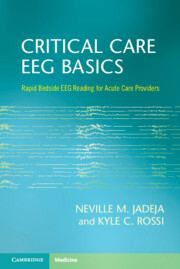Book contents
- Critical Care EEG Basics
- Critical Care EEG Basics
- Copyright page
- Dedication
- Contents
- Foreword
- Preface
- Acknowledgments
- How to Read This Book
- Part I Introduction
- Chapter 1 EEG Basics
- Chapter 2 Indications
- Chapter 3 Real-Time Bedside EEG Reading
- Chapter 4 Recognizing Artifacts and Medication Effects
- Chapter 5 Epileptiform Discharges, Seizures, and Status Epilepticus
- Chapter 6 Rhythmic and Periodic Patterns (RPPs) and the Ictal‐Interictal Continuum (IIC)
- Chapter 7 Post–Cardiac Arrest EEG
- Chapter 8 Quantitative EEG (EEG Trend Analysis)
- Part II Case-Based Approach to Specific Conditions
- Appendix Understanding EEG Reports
- Index
- References
Chapter 6 - Rhythmic and Periodic Patterns (RPPs) and the Ictal‐Interictal Continuum (IIC)
from Part I - Introduction
Published online by Cambridge University Press: 22 February 2024
- Critical Care EEG Basics
- Critical Care EEG Basics
- Copyright page
- Dedication
- Contents
- Foreword
- Preface
- Acknowledgments
- How to Read This Book
- Part I Introduction
- Chapter 1 EEG Basics
- Chapter 2 Indications
- Chapter 3 Real-Time Bedside EEG Reading
- Chapter 4 Recognizing Artifacts and Medication Effects
- Chapter 5 Epileptiform Discharges, Seizures, and Status Epilepticus
- Chapter 6 Rhythmic and Periodic Patterns (RPPs) and the Ictal‐Interictal Continuum (IIC)
- Chapter 7 Post–Cardiac Arrest EEG
- Chapter 8 Quantitative EEG (EEG Trend Analysis)
- Part II Case-Based Approach to Specific Conditions
- Appendix Understanding EEG Reports
- Index
- References
Summary
This chapter focuses on rhythmic and periodic patterns (RPPs). These are common EEG patterns found in critically ill patients. The variety of different types of patterns and their standardized naming conventions are described here. These patterns span from serving as markers of encephalopathy, to markers of seizure risk (interictal), to status epilepticus itself (ictal), and everything in between. This broad potential of diagnostic significance is known as the ictal–interictal injury continuum (IIIC). This chapter describes strategies for differentiating between more benign and more malignant RPPs. Basic management strategies for these IIIC patterns are also described in this chapter.
Keywords
- Type
- Chapter
- Information
- Critical Care EEG BasicsRapid Bedside EEG Reading for Acute Care Providers, pp. 83 - 98Publisher: Cambridge University PressPrint publication year: 2024



